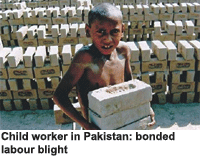Muhammad Ahsan gave his son away to his employer, a brick-kiln owner, after failing to pay back money he had borrowed, but feels embarrassed that the boy has ended up working as a domestic help in the latter’s home in Lahore. “I owed him Rs.100,000 (INR 52,000) and couldn’t afford to pay back,” says Ahsan. “He agreed to write off the amount if I ‘gave’ him my ten-year-old son, Sajjad, to work in his home washing dishes and cleaning floors. I am ashamed because I have in fact sold my son, and ended his schooling. But perhaps now I can afford to educate my two younger sons.”
 Ahsan’s story is not unique. Despite laws that proscribe it, bonded labour is common in contemporary Pakistan. In a 2009 report, the US government describes Pakistan as a source, transit, and destination country for men, women, and children trafficked for the purposes of forced labour and sexual exploitation.
Ahsan’s story is not unique. Despite laws that proscribe it, bonded labour is common in contemporary Pakistan. In a 2009 report, the US government describes Pakistan as a source, transit, and destination country for men, women, and children trafficked for the purposes of forced labour and sexual exploitation.
Pakistan’s largest human trafficking problem, according to the report, is of bonded labour. Concentrated in Sindh and Punjab provinces, it is particularly common in brick kilns, carpet-making, agriculture, fishing, mining, leather tanning, and production of glass bangles. Estimates of bonded labour victims vary widely, but together with forced marriages and women who are traded between tribal groups to settle disputes or as payment, they are likely to exceed one million, it says. The Karachi-based NGO Pakistan Institute of Labour Education and Research, in a 2003 study, found that over half a million people were working in brick kilns as bonded labour.
More recent data is hard to come by. The Pakistani National Coalition Against Bonded Labour, which is made up of a group of local NGOs, describes the practice as “one of the least known forms of slavery today, but responsible for enslaving millions of people around the world”.
Debts repayment apart, parents also sell children for other reasons. In the southern Punjab town of Vehari, Ghazala Bibi once stood in a city square for over seven hours, seeking “buyers” for her three children, Mahnoor (9), Abdullah (7), and Masooma (4). “My husband is a drug addict and I can no longer manage to feed my children,” said Ghazala, a domestic worker.
In a report released in April, the Asian Development Bank noted that food price inflation of over 10 percent in the first few months of 2011 has pushed another 6.94 million Pakistanis into poverty. It noted that the price of wheat had risen by 10 percent this year and rice by 13.1 percent. “We can no longer manage to offer our five children even a single decent meal. Prices are too high; I was recently laid off from my factory and now do only odd jobs, earning around Rs.6,000 (INR 3,120) per month. Almost the entire amount goes towards buying food,” says Fareed Ahmed, a textile factory worker.
There have also been reports of parents attempting to sell children — in one case from Quetta, the capital of Balochistan Province, simply for a bag of wheat flour.
(Excerpted and adapted from www.irinnews.org)